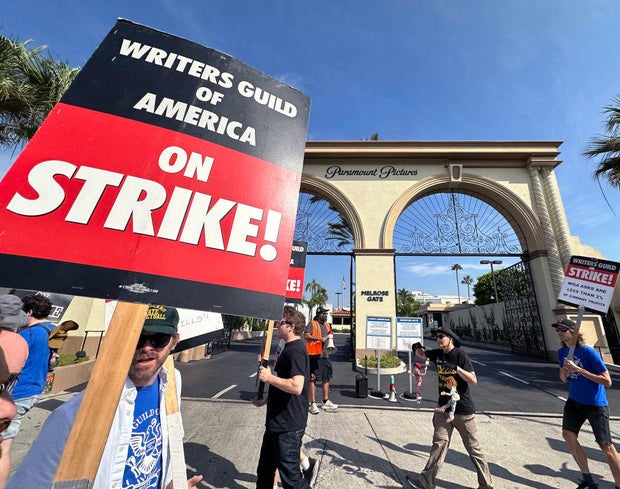The Writers Guild of America released the details of their tentative agreement with Hollywood studios and have unanimously voted to end the nearly 150-day strike.
Effective a minute after midnight tonight, writers can return to their jobs despite the ongoing ratification process. According to an email sent to the union’s membership the return to work “does not affect the membership’s right to make a final determination on contract approval.”
David Livingston/Getty Images
The three-year deal outlines a 12.5% pay increase starting with a 5% upon the contract’s ratification. For the following two years, writers will receive 4% and 3.5% increases, in the respective years.
Before the 148-day strike, the WGA asked the Alliance of Motion Picture and Television Producers for a 16% raise over three years.
In addition to raises, writers secured a 76% increase in their foreign streaming residuals. According to WGA, this will increase their residuals from Netflix from $18,684 to $32,830 for a single, hour-long episode. Writers will also receive a “viewership-based streaming bonus” between $9,000 and $40,500, depending upon the length of the show or if the streaming feature has a budget over $30 million.
To track the total viewership, the AMPTP agreed to share the total number of hours streamed domestically and internationally, as long as they remained confidential between the two sides. The information may be shared with union members, but only in an aggregated form.
The AMPTP capitulated on the mandatory staffing requirements they previously rebuked. According to the union, studios must hire at least three writer-producers, including the showrunner, for a guaranteed 10 consecutive weeks of work during the development of a series, also called “development rooms.”
Once projects are greenlighted, the minimum of writers increases to five once the series reaches seven episodes. Teams working on any shows that have 13 or more episodes will receive another writer. The WGA dubbed this facet of the production as “post-greenlight rooms.”
These projects come with at least 20 weeks of guaranteed work or the entire duration of the “post-greenlight room,” whichever is shorter.
One of the final sticking points that led to the historic strike stemmed from implementing artificial technology (AI). At first, writers wanted protection while the studios rejected the idea and only countered with an annual meeting “to discuss advancements in technology.”
Now, the two sides have established a set of guidelines regulating the use of AI in MBA-covered productions.
First, AI cannot write or rewrite any literary material and AI-generated material cannot be considered source material under this current deal. The WGA said this would prevent the material from undermining credits or other rights granted to writers. However, the rules do not bar writers from using AI to help with writing, if the company allows it and if the writer follows the company policies. The studios cannot require a writer to use AI software.
Studios must also inform writers if any of the materials they receive are AI-generated or contain AI-generated material. Finally, the WGA “reserves the right to assert that exploitation of writers’ material to train AI is prohibited by MBA or other law.”
This is a developing story. Check back for more details.
EDITOR’S NOTE: Many KCAL News producers and writers are WGA members. However, they are on a separate contract. Paramount Global owns CBS and KCAL News and is part of the AMPTP.
